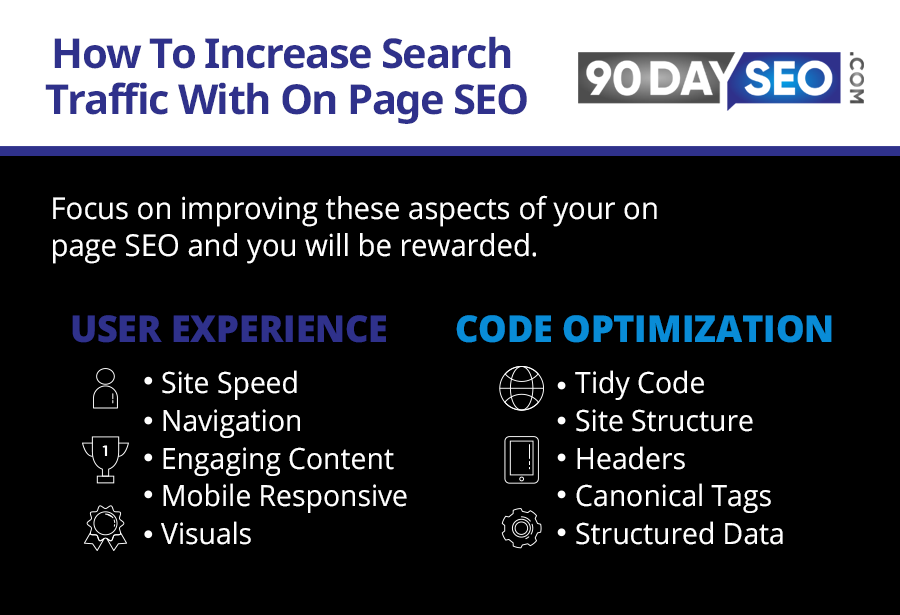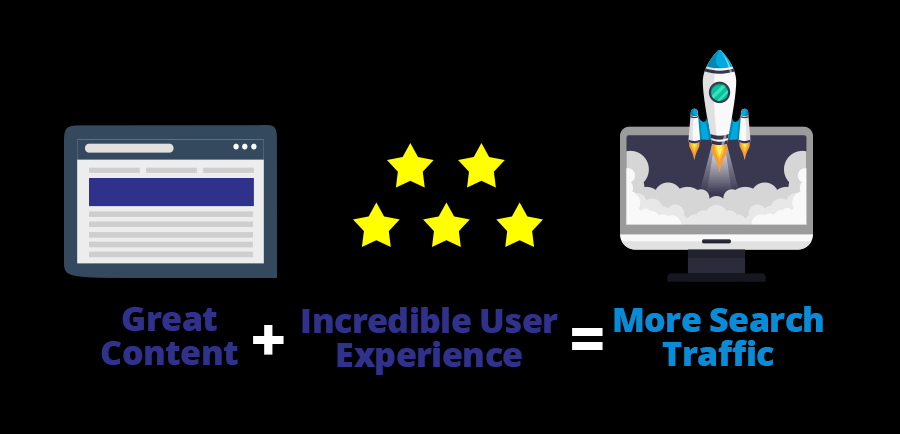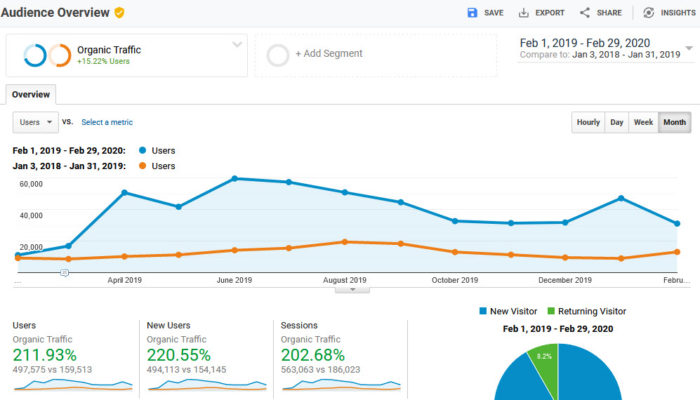On-page SEO is one of the most overlooked (but vitally important) parts of an effective SEO strategy.
It forms the foundation of good SEO and can make or break your website’s performance.
Without it, all of the other tactics you implement are a waste of time.
And, here’s the kicker…On page SEO is…
- Free to do
- Easy to implement
…and can have an instant impact on how your website ranks for your target keywords.
But despite that:
Most people glaze over on page SEO when it really should be a key focus. There are lots of SEO battles that can be won and it’s critical to build your castle on a solid foundation.
Take a look at this video on my blog if you didn’t see it already-
What Is On Page SEO?
On Page SEO is the process of optimising your website, content and code.
If you do this correctly is helps you rank higher in search engines.
This process (often referred to as On Site SEO) can be broken down into two parts which when optimized can both affect the performance of your website:
- User experience: Formatting and displaying your content to provide the most benefit to the reader
- Code optimisation: Making sure the HTML code and other elements of your site can easily be crawled by search engine crawlers
Doing this helps a search engine and its users to judge if this content is relevant, valuable and worthy of a high ranking for a specific search term.

By following on page SEO techniques…
- You can boost your page’s rankings
- Drive more relevant traffic back to your website
- Build a solid SEO foundation
And trust me when I tell you, opportunity is ripe because so many people don’t give on page SEO the respect it deserves.
Why Is On Page SEO Important?
On page SEO is important because it helps a search engine to fulfil its primary role of connecting people with search queries, to the most relevant content.
Google crawls your website looking for elements that indicate your content is a good fit and it’s our job to make sure it finds them.
The best part about on-page SEO though is…
You have complete control over it.
Everything that takes places on your site, from the source code to the quality of your content and the internal links…They’re all your responsibility and in your full control
Ensuring everything on your site is in tip-top condition before you focus on off-page SEO tactics like link building will save you from wasting huge amounts of budget and resource.
For example, I won’t accept articles from my writers if they are packed with junk code that’s leftover from Google Docs.
When I say junk code I’m talking about elements like:
- Span tags
- u0026amp;nbsp;
Which can often appear when an article is copied and pasted from a word processor into WordPress.
This invisible clutter makes your content harder to crawl and understand…
Which devalues your content in a search engine’s eyes.
Making your SEO strategy an uphill battle unnecessarily! Personally, I prefer to fight my battles downhill and so should you.
How On Page SEO Improves Rankings
To improve your on page SEO rankings, understand that…
Google is constantly trying to determine the quality of the content on your page.
They look whether:
- Your content is valuable: by looking for elements like headings, content length, images, videos, internal links and external links
- Your content has a good user experience: by looking at the speed, structure, layout and style of your page
By optimising your content to be as strong as possible in both of these categories…
You can see a dramatic increase in your website’s ranking.

Wall Street Oasis an online finance community forum, have a great example of this.
For five years they struggled to improve their website’s traffic and felt like a lost cause.
After trying lots of different external methods, they turned their attention to their website.
They found:
- Many of their website pages were poorly structured
- Their site contained messy elements (like super-long URLs)
- Their content was quite short and often duplicated in multiple threads
So they focused on improving the quality of the content on their website…
By improving the quality and structure of their website pages.
Namely they:
- Increased content length
- Consolidated duplicate content into single pages
- Structured their pages using headers
- Added “support” content like images and videos
The result?
Their organic search traffic increased 32%.
The first rise in search traffic they had experienced in years!
By making their pages more valuable to their visitors and structuring them in a way which made them easier to understand and crawl, Google viewed their website more positively.
This isn’t the only example of on page SEO increasing traffic, either.
In another case study, Cognitive SEO increased their website’s visibility 70%
By revamping and improving old content on their website.
And then there is this case study that I published where we took search traffic from from 159,513 to 497,575-

That site suffered from several major on page issues and the results of cleaning them up speak for themselves.
Google is clearly looking for websites and content that is:
- Fresh
- Valuable
- Well-structured
- And delivers a great user experience
…to rank in its search engines and on page SEO forms the foundation of it all!
Although off-site factors like backlinks are often made out to be more powerful…
…if you don’t have high quality content and a solid SEO foundation-
- You will need to spend more time and money building links because no one links to a lemon
- You will need to build more links in order to compensate for your on page SEO failures
All of which is an uphill battle that there is absolutely no reason to be having.
With a solid SEO foundation and good on page SEO, you will win more links with less effort whilst needing less links to rank.
Wrapping It Up
On page SEO is the process of optimising your website for both…
User Experience and Search Engine Algorithms.
It is heavily influenced by:
- Your website’s structure
- Your website’s coding
- The quality of your content
So I am going to guide you through the most important on page SEO factors that you need to pay attention to if you want to see search engine success.